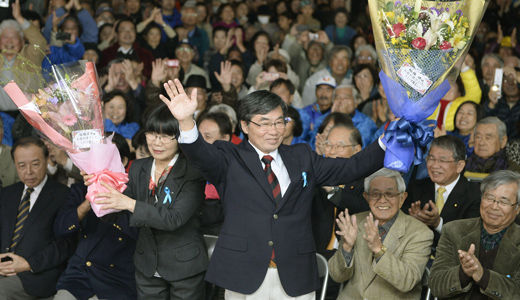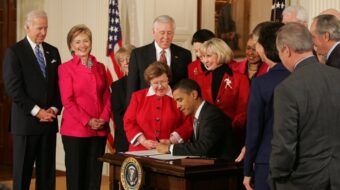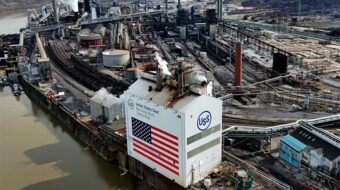
The mayor of Nago City, Okinawa, wants Americans to help him stop construction of a U.S. military base in his small city. He traveled to the U.S. last week to make his case.
Susumu Inamine was overwhelmingly re-elected to a second term as Nago’s mayor this January because of his strong opposition to the U.S. plan to build a massive new base in this environmentally sensitive coastal city of 62,000 residents.
The base would replace the existing U.S. Futenma Marine Corps Air Station, which is located in a densely populated urban area in central Okinawa. The planned move is a response to long-standing pressure from local residents to close Futenma. Repeated polls show 74 percent or more of Okinawans oppose relocating the Futenma base within Okinawa. In fact, the overwhelming majority want all U.S. bases out of Okinawa. Nevertheless, both the U.S. and Japanese governments say they are forging ahead with the relocation plan.
Mayor Inamine is appealing to Americans to help stop it.
Visiting New York and Washington last week, Inamine met with government officials, congressional staffers and think tank policy experts, and spoke with interested Americans. He found some sympathetic ears, including at the libertarian Cato Institute, Inamine said. However “the reaction of U.S. officials was pretty tough,” he said in a phone interview. “But we can still persuade.” The mayor spoke in Japanese, with English provided by a translator.
“Americans should know that local residents are not welcoming the base,” Mayor Inamine said. “U.S. residents should consider the huge budgetary burden and environmental impact on the local community.”
Inamine says he intends to use his rights as mayor to block the construction of the base. Japanese law stipulates the rights of local municipalities, he noted. “According to this, I have the right” to stop the construction. In order to use roads, piers and other public facilities, he said, “they have to get my approval. I will exercise my right as mayor.” He said residents are planning to create “a line of boats on the sea” in the Henoko area to demonstrate their opposition to the project.
The U.S. currently has some 85 military bases and installations in Japan, with about 50,000 military personnel, plus thousands of civilian Pentagon employees and dependents. The island of Okinawa, at the southern tip of Japan, is about one-third the size of Rhode Island. It constitutes only 0.6 percent of Japan’s land area, but contains more than 30 U.S. bases, taking up 20 percent of its land.
After more than 20 years of U.S. occupation following World War II, Okinawa reverted back to Japanese control in 1972, but, said Mayor Inamine, “for Okinawan people the situation has not changed.”
The state-of-the-art Futenma replacement base, part of the Obama administration’s “Asia pivot,” is tied to Japan’s current national and foreign policy, Inamine said. He noted that the Japanese government, which backs the U.S. presence, is trying to expand the re-militarization of its own “self-defense” forces.
The new base “is pushed strongly by the [Japanese] government against the wishes of the people,” he said. “Okinawans are not only controlled by U.S. military forces, they are also unfairly treated by the Japanese government. People strongly feel that Okinawa is being colonized by Japan.”
Residents have been actively organizing for years to get U.S. bases closed, either relocated to elsewhere in Japan or out of Japan entirely.
Okinawans are upset about crimes committed by U.S. service members, including rapes. Some 5,600 criminal charges have been brought by Okinawans against U.S. military personnel since 1972. They are also angry about noise pollution from military aircraft, firing ranges and other base activity, and about environmental harm. Earlier this year, U.S. military officials admitted that they had covered up massive PCB contamination at the U.S. Kadena Air Base since the 1980s. A furor also erupted among both U.S. service members and Okinawans over last year’s unearthing of 83 barrels containing dioxins and other toxic chemicals, including barrels labeled Dow Chemical, the manufacturer of Agent Orange, on land formerly part of the Kadena base that is now the Okinawa City soccer field.
The new base is slated to be constructed in the small seaside community of Henoko, part of Nago City, with runways built on an enormous landfill dumped into scenic Oura Bay. Oura Bay is home to rare types of coral and endangered species such as the dugong, a type of manatee. Relocation of the Futenma base to Henoko, Inamine says, “means destruction of this global treasure.” It is not just a local issue but also “very important in our global village,” he said.
Thus, the “dire situation in Nago City” should be of concern to environmental groups and civil society internationally, the mayor said.
He noted carefully, “I am not against the entire U.S. armed forces in Japan. I am opposed to construction of this base.”
Inamine, 68, is described as non-political. He was a city administrator for 30 years before being elected mayor in 2010. In his work, he said, “I always emphasized dialogue with the community.” He feels his current role is a continuation of that work.
“Whatever we do here is a legacy for future generations,” he said. “I would like to leave something for the future. The new base is supposed to last 100 years. We have already suffered 60-plus years [from the impact of U.S. bases]. If we leave this over another 100 years, it’s a negative heritage for our children.”
“Please, please spread what Okinawa people are feeling,” he concluded.
Photo: Nago City Mayor Susumu Inamine, center right, and his wife Ritsuko celebrate his re-election, Jan. 19, 2014. AP/Kyodo News












Comments